英语中时间名词前介词的用法
in、on、at关于时间用法
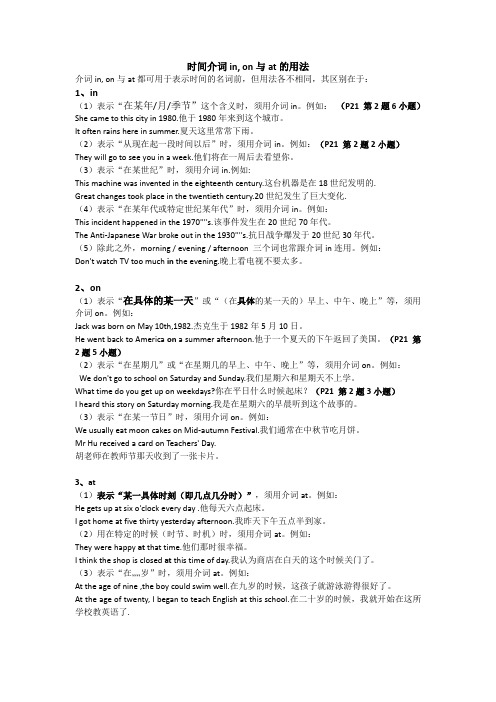
时间介词in, on与at的用法介词in, on与at都可用于表示时间的名词前,但用法各不相同,其区别在于:1、in(1)表示“在某年/月/季节”这个含义时,须用介词in。
例如:(P21 第2题6小题)She came to this city in 1980.他于1980年来到这个城市。
It often rains here in summer.夏天这里常常下雨。
(2)表示“从现在起一段时间以后”时,须用介词in。
例如:(P21 第2题2小题)They will go to see you in a week.他们将在一周后去看望你。
(3)表示“在某世纪”时,须用介词in.例如:This machine was invented in the eighteenth century.这台机器是在18世纪发明的.Great changes took place in the twentieth century.20世纪发生了巨大变化.(4)表示“在某年代或特定世纪某年代”时,须用介词in。
例如:This incident happened in the 1970''''s.该事件发生在20世纪70年代。
The Anti-Japanese War broke out in the 1930''''s.抗日战争爆发于20世纪30年代。
(5)除此之外,morning / evening / afternoon 三个词也常跟介词in连用。
例如:Don't watch TV too much in the evening.晚上看电视不要太多。
2、on(1)表示“在具体的某一天”或“(在具体的某一天的)早上、中午、晚上”等,须用介词on。
例如:Jack was born on May 10th,1982.杰克生于1982年5月10日。
He went back to America on a summer afternoon.他于一个夏天的下午返回了美国。
英语介词的用法
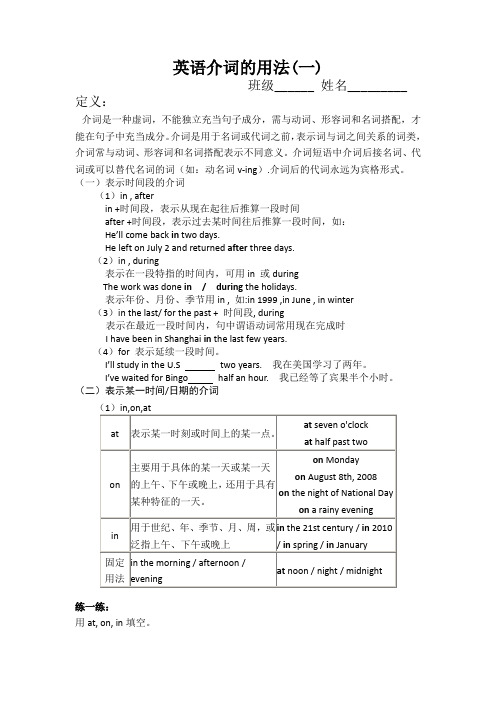
英语介词的用法(一)班级______ 姓名_________定义:介词是一种虚词,不能独立充当句子成分,需与动词、形容词和名词搭配,才能在句子中充当成分。
介词是用于名词或代词之前,表示词与词之间关系的词类,介词常与动词、形容词和名词搭配表示不同意义。
介词短语中介词后接名词、代词或可以替代名词的词(如:动名词v-ing).介词后的代词永远为宾格形式。
(一)表示时间段的介词(1)in , afterin +时间段,表示从现在起往后推算一段时间after +时间段,表示过去某时间往后推算一段时间,如:He’ll come back in two days.He left on July 2 and returned after three days.(2)in , during表示在一段特指的时间内,可用in 或duringThe work was done in / during the holidays.表示年份、月份、季节用in , 如:in 1999 ,in June , in winter(3)in the last/ for the past + 时间段, during表示在最近一段时间内,句中谓语动词常用现在完成时I have been in Shanghai in the last few years.(4)for 表示延续一段时间。
I’ll study in the U.S two years. 我在美国学习了两年。
I’ve waited for Bin go half an hour. 我已经等了宾果半个小时。
(二)表示某一时间/日期的介词练一练:用at, on, in填空。
1. ________ five o’clock2. _________ a quarter past seven3. ________ February 11th4. _________ a hot summer afternoon5. ________ winter6. ________ the evening7. ________ night 8. ________ the morning of Children’s Day(2)before, bybefore 表示某一时间之前,而by 表示到某一时间止,句中谓语动词多用完成时态。
介词in,on,at在表示时间时的区别
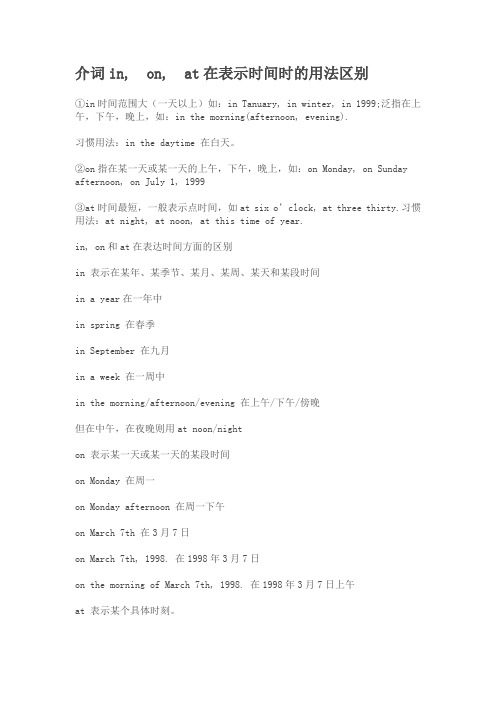
介词in, on, at在表示时间时的用法区别①in时间范围大(一天以上)如:in Tanuary, in winter, in 1999;泛指在上午,下午,晚上,如:in the morning(afternoon, evening).习惯用法:in the daytime 在白天。
②on指在某一天或某一天的上午,下午,晚上,如:on Monday, on Sunday afternoon, on July 1, 1999③at时间最短,一般表示点时间,如at six o’clock, at three thirty.习惯用法:at night, at noon, at this time of year.in, on和at在表达时间方面的区别in 表示在某年、某季节、某月、某周、某天和某段时间in a year在一年中in spring 在春季in September 在九月in a week 在一周中in the morning/afternoon/evening 在上午/下午/傍晚但在中午,在夜晚则用at noon/nighton 表示某一天或某一天的某段时间on Monday 在周一on Monday afternoon 在周一下午on March 7th 在3月7日on March 7th, 1998. 在1998年3月7日on the morning of March 7th, 1998. 在1998年3月7日上午at 表示某个具体时刻。
at eight o’clock 在8点钟at this time of the year 在一年中的这个时候at the moment 在那一时刻at that time 在那时注意:在英语中,如果时间名词前用this, last, next 等修饰时,像这样的表示,“在某时”的时间短语前,并不需要任何介词。
例如:last month, last week, this year, this week, next year, the next day, the next year等。
英语介词的使用
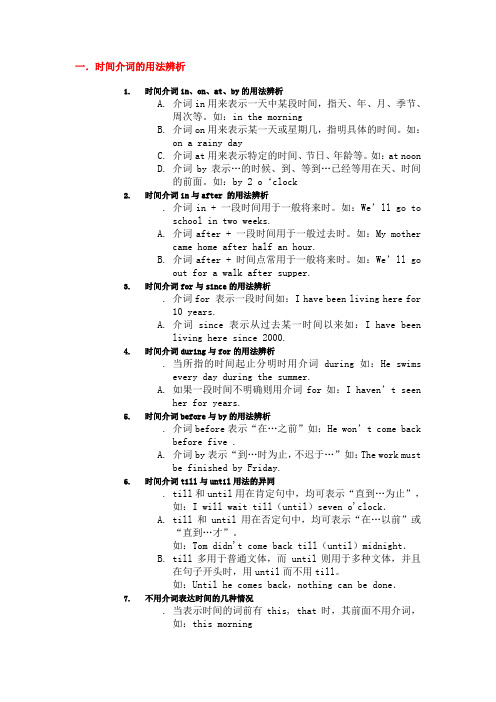
一.时间介词的用法辨析1.时间介词in、on、at、by的用法辨析A.介词in用来表示一天中某段时间,指天、年、月、季节、周次等。
如:in the morningB.介词on用来表示某一天或星期几,指明具体的时间。
如:on a rainy dayC.介词at用来表示特定的时间、节日、年龄等。
如:at noonD.介词by表示…的时候、到、等到…已经等用在天、时间的前面。
如:by 2 o‘clock2.时间介词in与after 的用法辨析.介词in + 一段时间用于一般将来时。
如:We’ll go toschool in two weeks.A.介词after + 一段时间用于一般过去时。
如:My mothercame home after half an hour.B.介词after + 时间点常用于一般将来时。
如:We’ll goout for a walk after supper.3.时间介词for与since的用法辨析.介词for 表示一段时间如:I have been living here for10 years.A.介词since 表示从过去某一时间以来如:I have beenliving here since 2000.4.时间介词during与for的用法辨析.当所指的时间起止分明时用介词during如:He swimsevery day during the summer.A.如果一段时间不明确则用介词for如:I haven’t seenher for years.5.时间介词before与by的用法辨析.介词before表示“在…之前”如:He won’t come backbefore five .A.介词by表示“到…时为止,不迟于…”如:The work mustbe finished by Friday.6.时间介词till与until用法的异同.till和until用在肯定句中,均可表示“直到…为止”,如:I will wait till(until)seven o'clock.A.till和until用在否定句中,均可表示“在…以前”或“直到…才”。
(完整版)英语中介词的用法
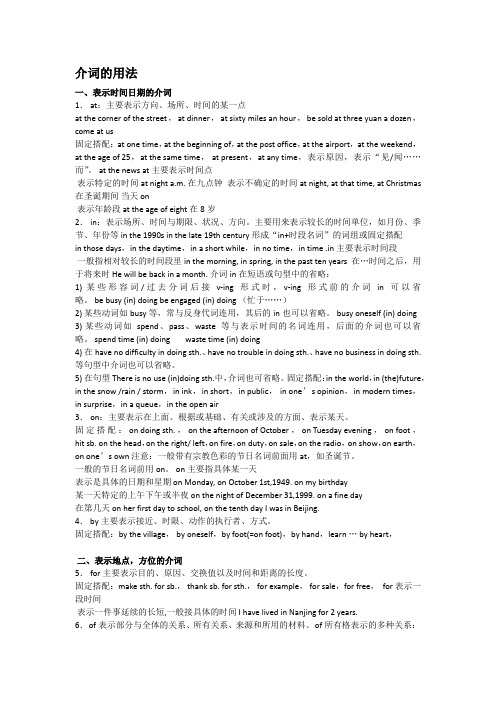
介词的用法一、表示时间日期的介词1.at:主要表示方向、场所、时间的某一点at the corner of the street,at dinner,at sixty miles an hour,be sold at three yuan a dozen,come at us固定搭配:at one time,at the beginning of,at the post office,at the airport,at the weekend,at the age of25,at the same time,at present,at any time,表示原因,表示“见/闻……而”。
at the news at主要表示时间点表示特定的时间at night a.m.在九点钟表示不确定的时间at night,at that time,at Christmas 在圣诞期间当天on表示年龄段at the age of eight在8岁2.in:表示场所、时间与期限、状况、方向。
主要用来表示较长的时间单位,如月份、季节、年份等in the1990s in the late19th century形成“in+时段名词”的词组或固定搭配in those days,in the daytime,in a short while,in no time,in time.in主要表示时间段一般指相对较长的时间段里in the morning,in spring,in the past ten years在…时间之后,用于将来时He will be back in a month.介词in在短语或句型中的省略:1)某些形容词/过去分词后接v-ing形式时,v-ing形式前的介词in可以省略。
be busy(in)doing be engaged(in)doing(忙于……)2)某些动词如busy等,常与反身代词连用,其后的in也可以省略。
介词in,on.at,for.with,by,of的基本用法

介词用法知多少介词是英语中最活跃的词类之一。
"同一个汉语词汇在英语中可译成不同的英语介词。
例如汉语中的“用”可译成:(1)用英语(in English);(2)用小刀(with a knife);(3)用手工(byhand);(4)用墨水(in ink)等。
所以,千万不要以为记住介词的一两种意思就掌握了这个介词的用法,其实介词的用法非常广泛,搭配能力很强,越是常用的介词,其含义越多。
下面就简单介绍几组近义介词的用法及其搭配方法。
一. in, to, on和off在方位名词前的区别1. in表示A地在B地范围之内。
如:Taiwan is in the southeast of China.2. to表示A地在B地范围之外,即二者之间有距离间隔。
如:Japan lies to the east of China.3. on表示A地与B地接壤、毗邻。
如:North Korea is on the east of China.4. off表示“离……一些距离或离……不远的海上”。
如:They arrived at a house off the main road.New Zealand lies off the eastern coast of Australia.二. at, in, on, by和through在表示时间上的区别1. at指时间表示:(1)时间的一点、时刻等。
如:They came home at sunrise(at noon, at midnight, at ten o’clock, at daybreak, at dawn).(2)较短暂的一段时间。
可指某个节日或被认为是一年中标志大事的日子。
如:He went home at Christmas(at New Year, at the Spring Festival, at night).2. in指时间表示:(1)在某个较长的时间(如世纪、朝代、年、月、季节以及泛指的上午、下午或傍晚等)内。
时间前面的介词
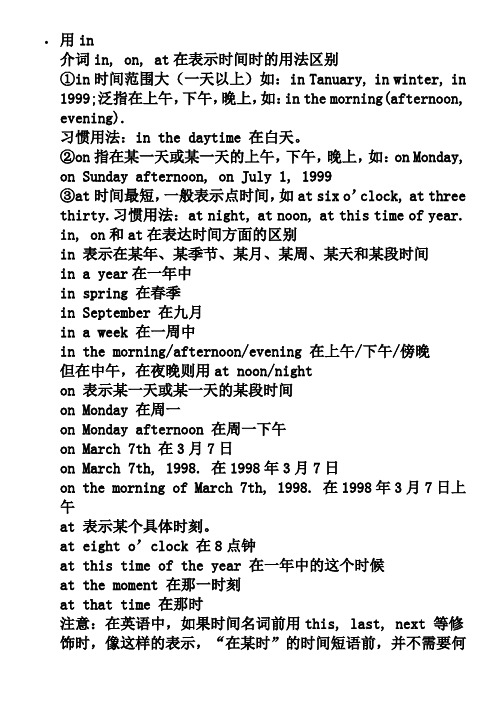
用in介词in, on, at在表示时间时的用法区别①in时间范围大(一天以上)如:in Tanuary, in winter, in1999;泛指在上午,下午,晚上,如:in the morning(afternoon, evening).习惯用法:in the daytime 在白天。
②on指在某一天或某一天的上午,下午,晚上,如:on Monday,on Sunday afternoon, on July 1, 1999③at时间最短,一般表示点时间,如at six o’clock, at threethirty.习惯用法:at night, at noon, at this time of year.in, on和at在表达时间方面的区别in 表示在某年、某季节、某月、某周、某天和某段时间in a year在一年中in spring 在春季in September 在九月in a week 在一周中in the morning/afternoon/evening 在上午/下午/傍晚但在中午,在夜晚则用at noon/nighton 表示某一天或某一天的某段时间on Monday 在周一on Monday afternoon 在周一下午on March 7th 在3月7日on March 7th, 1998. 在1998年3月7日on the morning of March 7th, 1998. 在1998年3月7日上午at 表示某个具体时刻。
at eight o’clock 在8点钟at this time of the year 在一年中的这个时候at the moment 在那一时刻at that time 在那时注意:在英语中,如果时间名词前用this, last, next 等修饰时,像这样的表示,“在某时”的时间短语前,并不需要何介词。
例如:last month, last week, this year, this week, next year, the next day, the next year等。
时间名词前所用介词1

时间名词前所用介词时间名词前所用介词的速记歌年月周前要用in,日子前面却不行。
遇到几号要用on,上午下午又是in。
要说某日上下午,用on换in才能行。
午夜黄昏须用at,黎明用它也不错。
at也用在时分前,说“差”可要用上to,说“过”只可使用past,多说多练牢牢记,莫让岁月空蹉跎。
下面就时间概念的介词用法做一简要介绍和比较。
1.at表示时间概念的某一个点。
(在某时刻、时间、阶段等)。
at1:00(dawn,midnight,noon)在一点钟(黎明、午夜、中午)these are our chief tasks at the present stage.这些就是我们现阶段的主要任务。
2.on1)表示具体日期。
they arrived in shanghai on may25.他们在五月二十五日到达上海。
注:(1)关于"在周末"的几种表示法:at(on)the weekend在周末---特指at(on)weekends在周末---泛指over the weekend在整个周末during the weekend在周末期间(2)在圣诞节,应说"at christmas而不说"on christmas2)在(刚……)的时候。
on reaching the city he called up his parents.一到城里他就给父母打了一个电话。
3.in1)表示"时段"、"时期",在多数情况下可以和dur-ing互换,前者强调对比,后者强调持续。
in(during)1988(december,the20th century)在一九八八年(十二月、二十世纪)i returned to beijing in the middle of june.我是六月中回北京的。
但如果表示"在某项活动的期间",则只能用during。
- 1、下载文档前请自行甄别文档内容的完整性,平台不提供额外的编辑、内容补充、找答案等附加服务。
- 2、"仅部分预览"的文档,不可在线预览部分如存在完整性等问题,可反馈申请退款(可完整预览的文档不适用该条件!)。
- 3、如文档侵犯您的权益,请联系客服反馈,我们会尽快为您处理(人工客服工作时间:9:00-18:30)。
时间名词前介词的用法
一、用in的场合
(1)表示在某年/月/季节”这个含义时,须用介词in。
例如:in 1980.
(2)表示从现在起一段时间以后”时,须用介词in。
例如:They will go to see you in a week.
(3)表示在某世纪”时,须用介词in.例女口:This mach ine was inven ted in the eightee nth cen tury.
(4)表示”在早上、下午、晚上须用介词in.例女口: in the morning / eve ning / after noon
二、用on的场合
(1)表示在具体的某一天”或“(在具体的某一天的)早上、中午、晚上”等,须用介词on。
例如:on May 10th,1982,on a rai ny morni ng,on a summer after noon.
练习:
This festival is a cheerful occasion, for ______ this day, the dead are said to return to their homes and
they are welcomed by the liv ing
这是个欢乐的日子,据说这一天,死者回家而活着的人欢迎他们
Mother's Day is _______ the sec ond Sun day of May. It ' a day to tha nk mothers. On that
day mothers usually get flowers and cards from their children.
(2)表示在星期几”或在星期几的早上、中午、晚上”等,须用介词on。
例如:on Saturday,on Saturday morning, on weekdays在平时/周日
(3)表示在某一节日”时,须用介词on。
例如:on Mid-autumn Festival, on Teachers' Day.
注意:当morning,evening,afternoon被of短语修饰,习惯上用in,而不用on.例如:
in the early morni ng of September 10th 在9 月10 的清晨;in the late after noon of September 12th 在9月12日的傍晚。
三、用at的场合
(1)表示某一具体时刻(即几点几分时) ”须用介词at。
例如:at six
(2)用在特定的时候(时节、时机)时,须用介词at。
例如:
They were happy at that time.他们那时很幸福。
(3)表示在中午、在夜晚、在午夜、在周末(也可用
on) ”时,须用介词at。
例如:at midnight, at/on weekends
What do you often do at noon?你中午经常做些什么?
You can see many stars in the sky at night.夜晚你能看到天空中有许多星星。
(4)表示在……岁”时,须用介词at。
例如:
At the age of nine ,the boy could swim well.在九岁的时候,这孩子就游泳游得很好了。
四、用by的场合
by+时间名词。
意为:到…时(已发生某事),此时谓语多用完成时;最晚、不迟于…,在…之前”。
如: by now/then/this time/next Friday/the end of/three o'clock 等。
By the end of last year,another new gymnasium had been completed.
到去年年底,又有一座新体育馆峻工了。
The train leaves at 6:00 pm.So I have to be at the station by 5:40 pm at the latest. 火车下午六点开,所以最晚我得五点四十赶到车站。
时间名词前不用介词的情况
1. 在today, tomorrow, yesterday, the day before yesterday,等表示时间概念的名词前一般不用介词。
例如:
1) What are you going to do tomorrow?
2) We have had six lessons today.
3) We had a good time the day before yesterday.
2. 由this, that ,these, those等用于表示时间概念的名词前,前面往往不加介词。
例如:
1) That morning he got up very early.
2) What are you busy with these days?
3. 由next, last, the next, the last等用于表示时间概念的名词前时,前面不用介词修饰。
例如:
1) We pla nted many trees last spri ng.
2) She said she would pay a trip to Suzhou the n ext mon th.
3) The very next time I saw her, she was working in London.
4. 在each, any, every, some, all等用于表示时间概念的名词前,一般不用介词来修饰。
例如:
1) The buses go every 10 minu tes.
2) Jack coughed all night.
3) We have to get up very early every/each day.。
